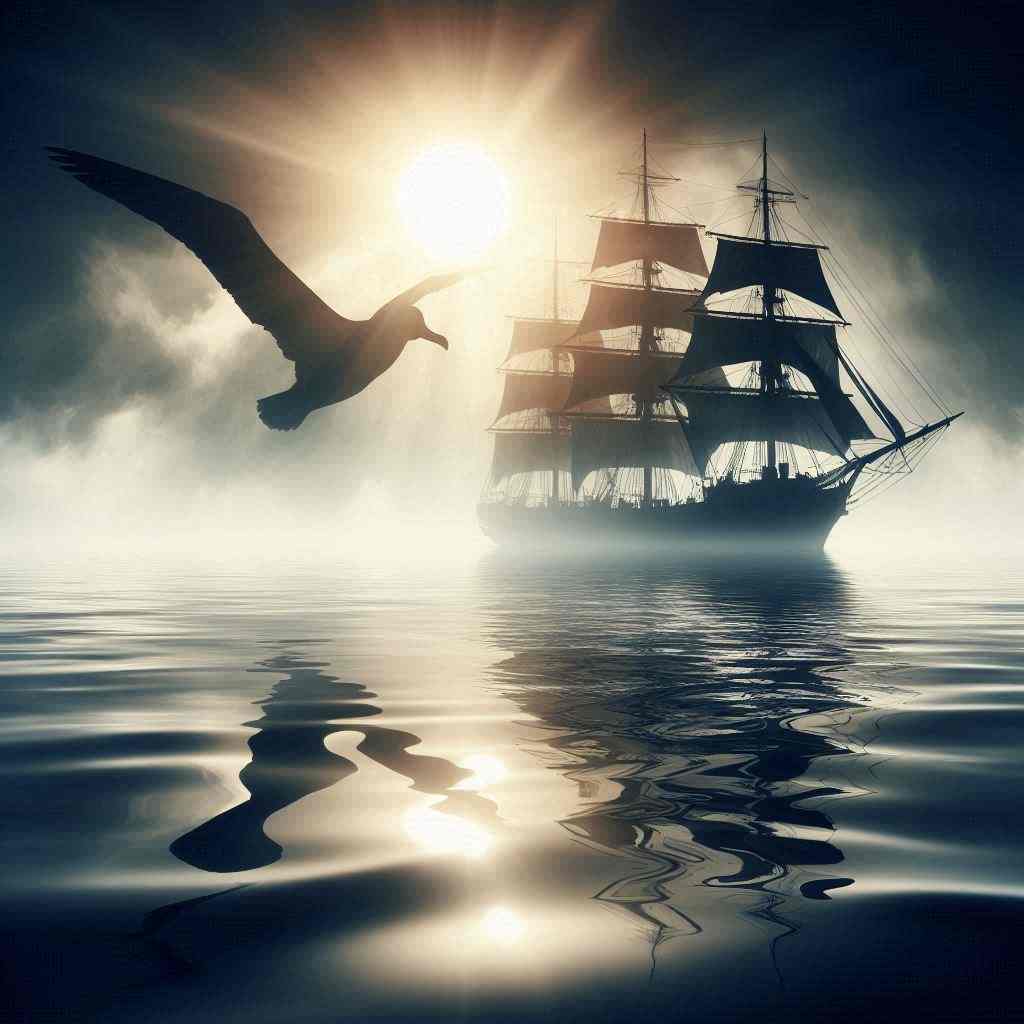The Mariner's Curse
Richard

Out on the ocean, we set our sails,
A mariner's tale through the stormy gales,
An albatross soaring, a symbol of grace,
We cheered and we hailed, in that desolate place.
But oh, the mariner's hand,
Struck down the bird that graced our land,
Now a curse upon our fate,
In this vast and empty expanse.
The winds they did die, the sun stood still,
A silent sea, a foreboding chill,
With heavy hearts and parched dry throats,
We paid the price for what we wrote.
Water, water, everywhere,
And all the boards did shrink,
Water, water, everywhere,
Nor any drop to drink.
The dead men stood with vacant eyes,
As the mariner faced his solemn cries,
A life of penance, a tale to tell,
To wander the earth, a living shell.
A lesson learned through endless strife,
To cherish all that shares our life,
The albatross, a spirit's guide,
In every heart, the truth does bide.
Now hear the mariner's call,
Respect the life that binds us all,
For every action bears its weight,
In the web of our shared fate.
Richard's The Mariner's Curse
"The Mariner's Curse" weaves a haunting tapestry of guilt, redemption, and the profound consequences of our actions. Drawing inspiration from Samuel Taylor Coleridge's "The Rime of the Ancient Mariner," this ballad explores the delicate balance between humanity and nature, and the weight of our choices in the grand scheme of existence.
The song opens with a scene of hope and adventure, as sailors set out on a journey across the vast ocean. The arrival of an albatross, traditionally seen as a good omen by seafarers, initially brings joy and optimism to the crew. However, this moment of grace is shattered by a single, fateful act: the mariner's inexplicable decision to kill the bird. This action serves as the fulcrum upon which the entire narrative turns, transforming a tale of exploration into one of cosmic retribution.
The repeated refrain, "But oh, the mariner's hand, / Struck down the bird that graced our land," acts as a mournful reminder of the irreversible nature of our deeds. It echoes throughout the song, emphasizing the ripple effect of a single moment of thoughtlessness or cruelty. The curse that follows is not just a supernatural punishment, but a manifestation of the natural world's response to human disregard.
As the story unfolds, we witness the physical and psychological toll of the curse. The vivid imagery of a becalmed ship, shrinking boards, and the cruel irony of being surrounded by undrinkable water all serve to illustrate the sailors' desperate plight. The famous lines borrowed from Coleridge, "Water, water, everywhere, / Nor any drop to drink," encapsulate the essence of their torment - abundance without sustenance, life without living.
The transformation of the crew into lifeless specters, standing with "vacant eyes," paints a chilling picture of the ultimate cost of the mariner's transgression. It's not just physical death that haunts them, but a kind of spiritual death - a loss of humanity in the face of nature's wrath. The mariner's fate, to wander the earth as a "living shell," bound to share his cautionary tale, speaks to the enduring nature of guilt and the power of storytelling as both punishment and redemption.
In its final verses, the song shifts towards a message of hope and wisdom hard-won through suffering. The albatross is reframed as a "spirit's guide," suggesting a deeper spiritual connection between humans and the natural world. The call to "cherish all that shares our life" serves as the moral heart of the tale, urging listeners to recognize the sacred in the everyday and to treat all life with reverence.
The closing stanza broadens the scope of the mariner's lesson, reminding us that every action "bears its weight, / In the web of our shared fate." This powerful imagery connects individual choices to the broader tapestry of existence, emphasizing our interconnectedness with all living things and the responsibility that comes with it.
"The Mariner's Curse" is not just a retelling of a classic tale, but a poignant reflection on the human condition. It speaks to timeless themes of hubris, redemption, and the often harsh lessons taught by nature. In an age of environmental crisis and ethical reckonings, the song's message resonates with particular urgency, calling us to consider the far-reaching consequences of our actions and our place within the delicate balance of life on Earth.
This text was generated by AI and is for reference only. Learn more
Want to join the discussion? Reopen or create a unique username to comment. No personal details required!



Comments
No comments yet. Be the first to comment!